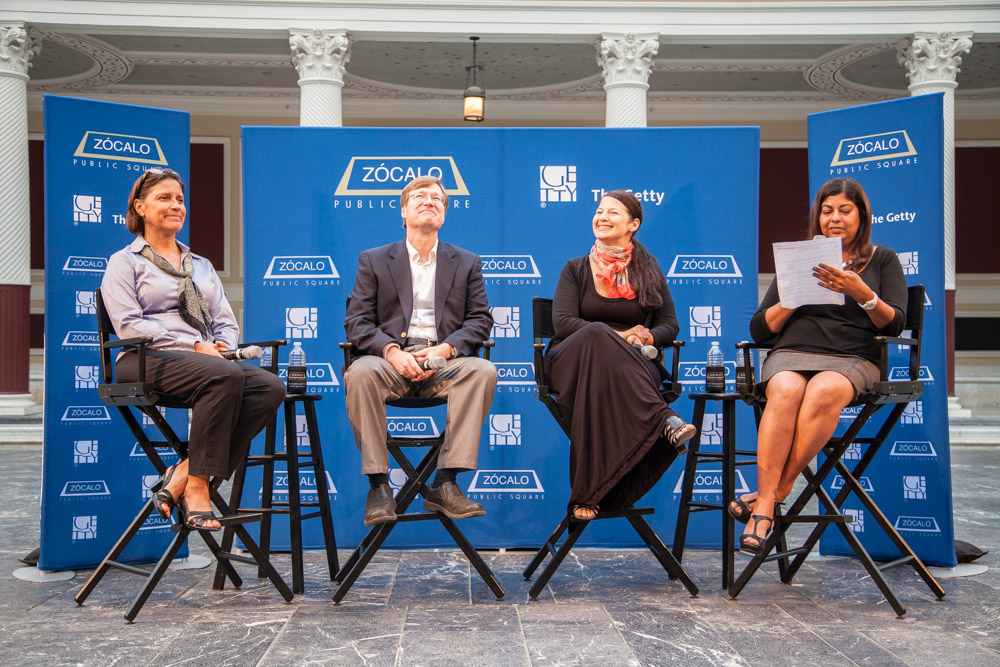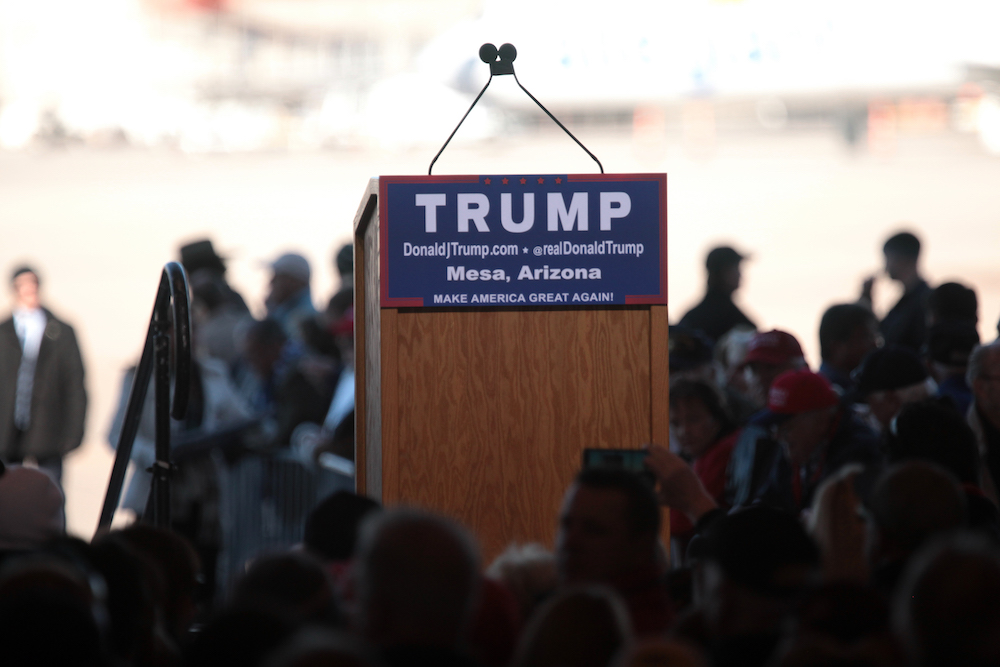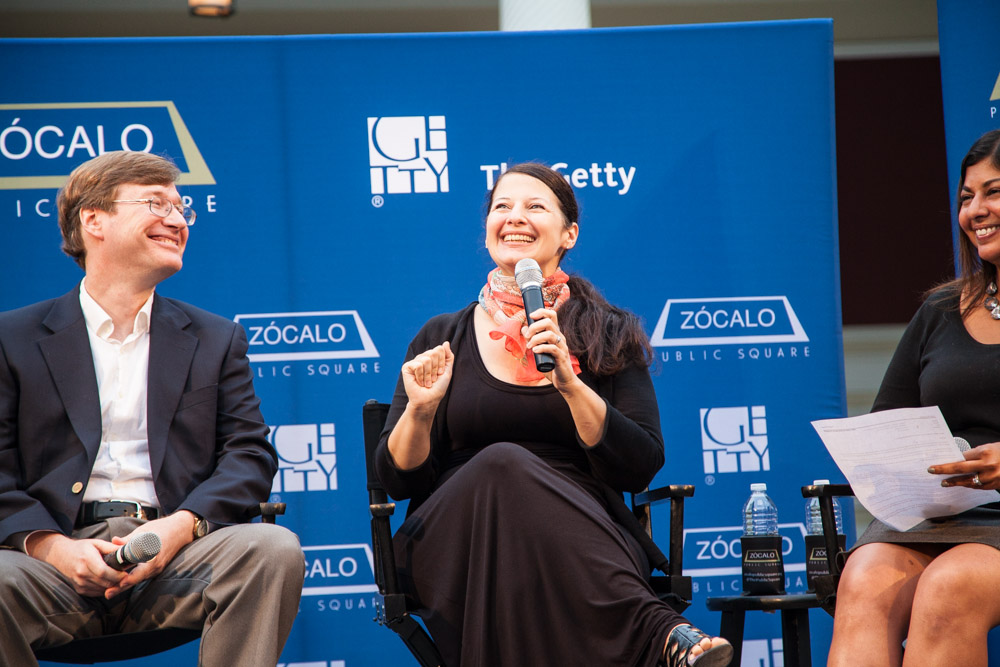
 There’s plenty of nastiness in our democracy. But is there anything new?
There’s plenty of nastiness in our democracy. But is there anything new?
For all the fear and consternation about the lies, insults, conspiracy theories, and rhetorical excesses of the 2016 presidential election, today’s political troubles have been familiar features of democracy since its invention 2,500 years ago, said a panel of scholars of classics, history, and communications during “How Does Democracy Survive Demagoguery?,” a Zócalo/Getty Villa “Open Art” event.
The wide-ranging conversation at the Getty Villa covered accused demagogues from Pericles to Cicero, Thomas Jefferson to Bernie Sanders. The panelists cautioned that “demagogue” hasn’t always had a negative connotation; in antiquity it often had the ambiguous definition of a politician who speaks for the people.
And at times, panelists suggested that there is at least a bit of demagoguery in any democracy, and in almost any democratic politician.
With perhaps one exception, the only current presidential candidate who wouldn’t be recognized as a demagogue in ancient times might be Hillary Clinton—because as University of Florida classicist Victoria Emma Pagán noted, “There wouldn’t have been a Hillary Clinton in ancient Rome or ancient Greece—women did not participate in the government at all.”
At that, Indiana University historian Eric Robinson quipped: “I’d deny that Hillary Clinton is a demagogue. … To be a demagogue, one of the things you’d have to be is a very, very persuasive public speaker.” And he added, “I wouldn’t accuse Clinton” of being able to fire up a crowd.
Robinson said that the classic example of a demagogue was the ancient Greek leader Cleon. “He would stomp up and down the stage, pull up his robes, and shout,” said Robinson, who teaches Greek and Roman history. Records of Cleon’s speeches “show him insulting his political opponents, drawing on the anger of the audience, engaging in bluster about the need to project strength at all times. … Some of this may sound a little familiar.”
Texas A&M University communications professor and rhetorician Jennifer Mercieca said, “One thing that’s consistent from ancient Athens through to today, when we think about demagoguery, we’re really thinking about uncontrollable leaders, who don’t follow norms.” She added, “Americans are obsessed with preventing demagoguery.”
Pagán, the University of Florida classicist, asked the audience to consider trust in thinking about demagogues and democracy. It’s an important currency—and demagogues can succeed when they win the audience’s trust. But today, trust is breaking down in the U.S.—not only trust between leaders and the people, but trust between different parts of the population.
Pagán said that other accusations—of conspiracy or corruption—are much more toxic than to claim someone is a demagogue. “The thing about the charge of demagoguery is that it can be countered. If you call somebody a conspirator, it’s harder to retract. … If you say someone is a demagogue—we can have a really good conversation about whether Bernie Sanders is a demagogue. Just calling someone a demagogue is a starting point.”
Donald Trump was frequently mentioned in the conversation, and in audience questions. But Robinson noted that conspiracy theories, which pass for talking points in speeches of the presumptive Republican nominee, were used by ancient Greek politicians as well. And Pagán pointed out that Cicero, the Roman orator and politician, “used insult and invective in ways that we can’t even begin to imagine. … Trump’s insults look like kindergarten stuff” in comparison.
But in ancient Rome, she said, “Every time Cicero talks about fear, he also says … ‘And these are the steps I’m taking to protect you.’” Today’s demagogic politicians don’t appear to be as specific and concrete in explaining what they’re doing or proposing, she suggested.
The panel’s moderator, Los Angeles Times political reporter Seema Mehta, asked the scholars how, in the past, one fought against demagogues. The panel’s answer: it’s never been easy. Pagán noted that you don’t want to engage in discussion with demagogues. Mercieca explained that America’s founding fathers tried to create a weak executive and our system of checks and balances in part to check demagogues. But, she added, the executive branch has grown far more powerful than they intended.
Successful demagogues, the panelists noted, often get their way, though sometimes a clever historian like Thucydides can expose their tricks for the benefit of future generations. And the opponents of one Roman demagogue had success by taking his exaggerated promises and exaggerating them further—“out-demagoguing the demagogue.”
Demagogues can prosper in times of anger. And Mercieca, the Texas A&M communications professor, said that extreme polarization creates “a context within which demagoguery can flourish. When you have people getting very isolated news information from a very specific perspective … you create enemies out of the other.”
Mercieca, who is writing a book about Trump, noted that while his methods seem new, he is using ancient rhetorical techniques, from threats of force, to ad hominem attack to paralipsis. That last refers to the technique of saying, “I’m not saying … but I’m saying”—essentially repeating gossip or rumors but eliding accountability for it. Mercieca, cheekily exemplifying this, began to claim that one of Trump’s ex-wives said he kept Hitler’s speeches by his bed, before catching herself and admitting she couldn’t prove it. “It’s been reported,” she said, Trump-style, to laughter.
Another issue, she added, is that American presidential candidates have come to depend on appeals to fear. “Presidential candidates try to create a crisis for the nation, and insert themselves into that crisis as the hero of that moment,” she said.
In response to an audience question, Robinson suggested that today’s demagogic politicians be countered with the “ancient answer”: debates in which one candidate’s speech is immediately countered on the same stage by another candidate’s speech.
The problem today is that we hear speeches in fragments, and the media responses to speeches are also fragmented. Our televised debates require such short answers that they don’t offer a real opportunity to challenge demagoguery.
“Maybe it’s time to bring back ancient debate,” Robinson said.






Send A Letter To the Editors